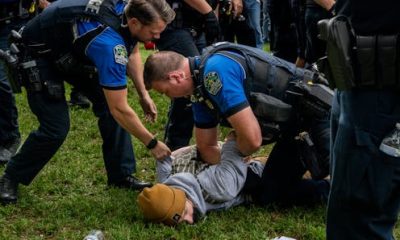
It’s important to democracy to have difficult discussions across political lines. MirageC/Moment via Getty Images
Millions of Americans believe that the 2020 presidential election was stolen. They think Donald Trump won by a landslide in 2020 and lost only because of widespread voter fraud. Some of the people who hold these views are my relatives, neighbors and professional associates. Because I reject these claims, it can be difficult to talk to those who accept them.
Often, we avoid the topic of politics. But as a political science scholar, I expect that as the 2024 election gets closer, conversations about 2020 will become more common, more important and more unavoidable.
So, what does someone like me, who concludes that the last presidential election was legitimately won by Joe Biden, say to those who think that Trump was the actual winner? Here are a few of the questions I raise in my own conversations about 2020.
This is not what democracy looks like.
AP Photo/Jose Luis Magana
Polls and pollsters
I usually begin by asking about polls. Polls and pollsters are often wrong about close elections, and many prominent pollsters tilt toward Democrats. They predicted a Hillary Clinton victory in 2016.
But even those polls and pollsters would be unlikely to have missed a 2020 landslide for Trump – or Biden. Unless, of course, as was the case, the landslide did not exist.
Recent political polling has been less accurate than many people expect. And all polls have margins of error: They provide an imperfect picture of public sentiment in a closely divided nation.
That said, even polls with a sizable margin of error should have been able to find a Trump landslide in 2020 – but they didn’t, because there wasn’t one. The last American presidential landslide, Reagan in 1984, was clearly seen in preelection polling.
If millions of fraudulent votes were cast in 2020, reputable pollsters would have discovered a discrepancy between their data and official election results. This would have been particularly true for the pollsters trusted by Republicans.
Trump himself has often praised the Rasmussen polling organization. But just before Election Day 2020, Rasmussen reported that Trump could win a narrow victory in the Electoral College only if he swept all the toss-up states – a daunting task. Rasmussen found no evidence of a forthcoming Trump landslide and projected that Biden would get 51% of the national popular vote. That’s almost exactly the percentage he received in the official count.
Where is the congressional investigation of 2020 voter fraud?
The House Republicans have not convened a special committee to investigate the 2020 election. Such a committee could summon witnesses, hold high-profile hearings and issue a detailed report. It could explain to the American people exactly what happened in the presidential election, how the election was stolen and who was responsible. If the evidence collected justified it, they could make criminal referrals to the Justice Department. The Democrats did all of these things in connection to the events of Jan. 6, 2021.
What could be more important to the American public than a full and fair account of 2020 voter fraud? Donald Trump calls it “one of the greatest crimes in the history of our country.” Yet the Republicans on Capitol Hill have not authorized a major public and professional investigation of those alleged crimes. Perhaps, as former U.S. Rep. Liz Cheney claims, most Republican members of Congress know that Trump’s statements about massive voter fraud are false.
It would be hard, even for Congress, to investigate something that did not happen.
Former U.S. Rep. Liz Cheney says many Republicans in Congress don’t believe Trump’s lies.
When the big lie goes to court
Like Congress, or professional pollsters, the judicial system has ways to expose election fraud. Immediately after the 2020 election, the Trump campaign went to court more than 60 times to challenge voting procedures and results.
They lost in all but one case.
Related lawsuits have also been decided against those who claimed that the 2020 election was stolen.
For instance, Fox News was sued for defamation because of broadcasts linking Dominion voting machines to allegations of a rigged 2020 election. Fox, a powerful and wealthy corporation, could have taken the case to trial but didn’t. Instead, it paid three-quarters of a billion dollars to settle the case.
In another case, Rudy Giuliani has been ordered to pay $148 million to Georgia election workers he falsely accused of misconduct. More civil suits are pending.
Trump’s claim of a win in 2020 – known by its critics as “The Big Lie” – has regularly and repeatedly lost in court. If there were any truth to what Trump and his supporters say about the 2020 election, shouldn’t there be lawyers who present effective evidence and judges who give it credence? So far, there are not.
Donald Trump doesn’t think the U.S. is a democracy.
Democracy in America?
Hard conversations about election integrity often come around to a more fundamental question: Do we still have democracy in America?
I think we do. Our democracy is fragile and under greater stress than at any time since the Civil War. But it is still a democracy. The rule of law may be slow, but it prevails. Harassed and threatened election officials do their jobs with courage and integrity. Joe Biden, the official winner of the 2020 election, sits in the White House.
Supporters of Donald Trump are likely to think that the U.S. is not a democracy. In their beliefs about how America works, millions of illegal votes are cast and counted on a regular basis; news is fake; violence is justified to halt fraudulent government proceedings; and it’s OK for a presidential candidate to want to be a dictator – if only for a day.
In a functioning democracy, everyone has constitutionally protected rights to hold and express their political opinions. But I believe we should all be willing to discuss and evaluate the evidence that supports, or fails to support, those opinions.
There is no verified evidence of widespread voter fraud in 2020. You can’t find it in the polls. You won’t get it from Congress. Claims of election wrongdoing have failed in the courts. I sometimes ask my friends what I am missing. Maybe what’s really missing is a readiness for the hard political conversations that I believe must be had in the 2024 election season.
Robert A. Strong does not work for, consult, own shares in or receive funding from any company or organization that would benefit from this article, and has disclosed no relevant affiliations beyond their academic appointment.
Advertisement

Advertisement
Contact Us
If you would like to place dofollow backlinks in our website or paid content reach out to info@qhubonews.com











